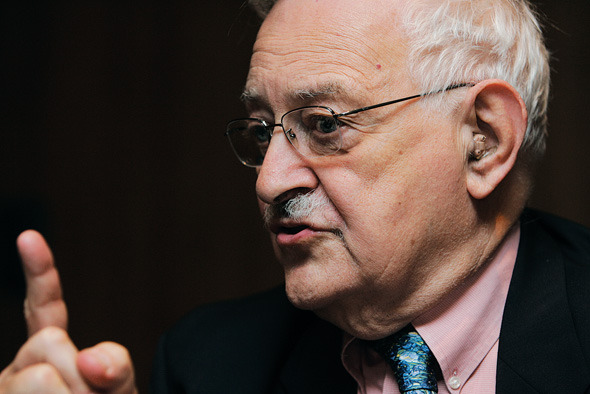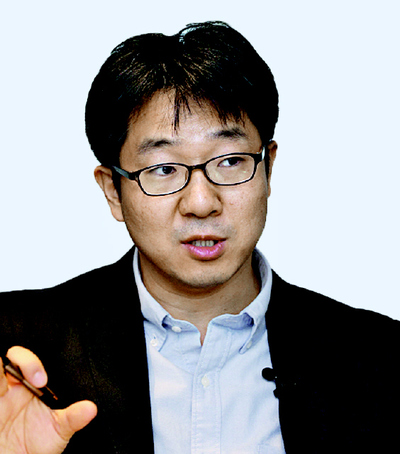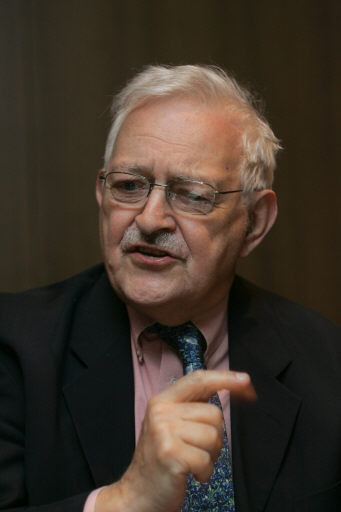한겨레에서 진행한 서면 인터뷰입니다.
월러스틴과 같은 정치경제학자도 자본주의의 대안에 대해서 새로운 형태의 삶을 이야기 합니다. 즉, 물질적인 동기에 의해 움직이는 것이 아니라, 평판과 자기만족에 의해 움직이는 체제입니다.
한글 번역
http://www.hani.co.kr/arti/culture/book/673081.html
아래는 영문버전
http://english.hani.co.kr/arti/english_edition/e_international/674079.html

Immanual Wallerstein, Senior Research Scholar, Yale University
Does capitalism have a future? Today’s capitalist system is facing such serious issues that the word “crisis” has become part of the everyday conversation, while discussions on alternatives have become tinged with despair. Last year saw the publication in Korean translation of a book that asks this very question: Immanual Wallerstein’s “Does Capitalism Have a Future?,” co-written with Randall Collins, Michael Mann, Georgi Derluguian, and Craig Calhoun (translated by Seong Baek-yong for Changbi Publishing). The release was accompanied by a conversation exchanged in letters between main author Wallerstein, a Yale University emeritus professor and analyst of global systems, and Lee Kang-kook, an economics professor at Japan’s Ritsumeikan University.
In the conversation, Wallerstein said the recent crisis of capitalism is beyond solving through the Keynesian approach of increasing state intervention. While Thomas Piketty, whose “Capital in the Twenty-First Century” has drawn global notice, contributed to the public debate on worsening inequality under the current global system, Wallerstein also noted that he suffers from the same limitations as other mainstream economists. According to Wallerstein, US hegemony is in a state of catastrophic collapse, and while its place could be taken by China and Northeast Asia, the growth of the middle-class of Chinese consumers is poised to strain the world economy and exacerbate the crisis. As an alternative, he suggested more environmentally-friendly pattern of living based in community closeness and social solidarity.
As South Korea loses its economic vitality, its future hinges on integration with the rest of Northeast Asia, Wallerstein said. He noted that the country could play a pivotal role in that process, but added that doing so would first require improving relations with North Korea and creating a system of inter-Korean integration.
The Global Financial Crisis and Its Aftermath

Lee Kang-kook, professor at Japan’s Ritsumeikan University.
Lee Kang-kook: First, I like to know about the reason and motivation why you and your co-authors planned to write this book. Why should we pose this fundamental question about capitalism now? We will ask you about the end of capitalism later in more detail.
Immanuel Wallerstein: We all believe that the world-system is in enormous difficulty and that the general discussion lacks historical depth as well as weak theorizing. We hope to stimulate a more useful debate about the world’s alternatives.
Lee: After the global financial crisis, the world economy has been in serious recession for long, much longer than economists expected. How do you evaluate the current state of the global economy, and especially responses of the advanced country governments such as quantitative easing policy? Following the crisis, Keynesians appear to have returned and become more powerful. They argue that the crisis was a failure of unregulated capitalism and the state can and should manage the capitalist economy rather successfully. I think that you must be very critical of this view.
Wallerstein: This is one of the things upon which the five authors do not agree. Two of us seem to argue that a Keynesian approach might work. Two others, including me, think the situation is way beyond that point. Even those who are sympathetic to a Keynesian approach argue that this is not enough.
Lee: Then, what do you think are fundamental causes and implications of the global financial crisis, and how is your view different from other positions, including lefitsts? I think that this crisis could be the specific crisis of financialization in the B phase of Kondratiev cycle from your perspective. But I am not so sure whether it is really a part of the structural crisis once in 500 years, as you emphasize.
Wallerstein: The major difference between my own view and that of many, probably most, leftists is that most leftists emphasize the strength of popular resistance to a worsening situation. I don’t deny this, but for me popular resistance is a long-time constant. What has been added now is the fact that capitalist accumulation via market processes no longer works for capitalists. Therefore, capitalists as well as the vulnerable classes are looking for alternatives to capitalism in order to ensure their wealth.
Lee: It is interesting that even in mainstream economics there are now concerns about a gloomy future of capitalism. For instance, Larry Summers mentioned ‘secular recession’ and Robert Gordon argues that growth rate will become lower in the long-run mainly due to stagnation in innovation. Could you make some comments on these arguments from your point of view?
Wallerstein: What you will notice in such mainstream gloom is that there always is an escape clause. They are saying: All is gloomy, unless you do x or y. I don’t think there is such an x or y.
Lee: Now, inequality in capitalism is a hot issue in economics. Thomas Piketty recently presented dynamics of inequality in capitalism in “Capital in the Twenty-First Century”, which became a bestseller. He calls for higher progressive income tax and global capital tax in order to reform capitalism. He predicts that the 21st century will become worse without any efforts since the return on capital tends to be higher than the growth rate. It brought about a serious debate among economists. How do you evaluate Piketty’s work and the related debate? What do you think of the dynamics of inequality in the history of capitalism?
Wallerstein: Piketty is basically an intelligent and very technically competent mainstream economist who favors a social-democratic solution to the situation. He suffers therefore from the same limitations of other mainstream economists. That said, his book has had the virtue of reinforcing a public debate about growing inequality in the world-system. And that is a good thing.
Capitalism and Prospects for Transition

Immanual Wallerstein, Senior Research Scholar, Yale University
Lee: You have argued that the fundamental cause of the end of the current system is a continuous rise of cost in production, including labor, input/infrastructure, and tax for several hundred years. I think your explanation is somewhat different from an original Marxist argument about the falling rate of profit rate due to the rise of organic composition of capital. Anyways, one may argue that the trend of rising costs is not so clear in reality. For example, at least wage has been stagnant after the 1980s in comparison with labor productivity growth, which resulted in a fall of the labor share. What do you think?
Wallerstein: The costs of production have always risen in a pattern of two steps upward, one step downward. You are noticing the one step downward, and ignoring the two steps upward. This pattern over 500 years has brought the costs to such a high level that they are approaching an asymptote and are too near the possible maximum price rate for their products. Hence, the system oscillates and is in chaotic wild swings.
Lee: In many works including this book, you have argued that the hegemony of the US under neoliberalism has been in decline. But the US has still great influence on other countries by military measures, enhancement of alliance, economic measures and others. What do you think of the future of the US hegemony? If it is true that the hegemony of the US is weakening in terms of the economic power and other countries are rising, does this change in hegemony necessarily aggravate the collapse of capitalism? One may think that continuous growth in other emerging market countries, higher than in the US, means that it is not the end but rearrangement of capitalism.
Wallerstein: US hegemony is not declining - it in catastrophic collapse. This ends its useful role as maintaining both the role of the U.S. in the system and its role as guarantor of the stability of the system as a whole. If the world-system were not in structural crisis, then yes other countries (such as a Northeast Asia bloc) might succeed to its role. This would take some time, and long before that happened, we would be out of the capitalist system.
Lee: What about rising China? Giovanni Arrighi thought of the Chinese system rather positively. In this book, Craig Calhoon also says that “Chinese-style state capitalism may be even more likely” as a future form of capitalism in this book. What do you think of China’s current growth and the possibility that the Chinese style state capitalism could become dominant?
Wallerstein: China’s growth in the last twenty years or so has been spectacular. But it is slowing already. And China may soon find itself in the same dilemmas as a state as most of the rest of the world. In addition, the numerically large increase of middle-class consumers in China is putting additional strain on the world-economy. It actually makes the crisis worse.
Lee: You say that there are two opposite possibilities after this structural crisis including Davos spirit and Porto Alegre spirit, both of which are also split into two camps. In fact, I happened to put the term ‘Davos and Porto Allegre’ in the title of my book to criticize globalization long ago. But I think there is still huge imbalance in power between these two and the conservative Davos group is the most powerful. Is there any possibility that a relatively reformist camp of Davos and a part of Porto Allegre may make coalition to reform capitalism?
Wallerstein: Yes this is a possible political coalition. I would call that a co-option by the reformist Davos group of the so-called reformist Porto Alegre group. The result would not be capitalism but a newkind of world-system that maintained the worst features of capitalism: hierarchy, exploitation, and polarization. This would not be a good outcome, but it is a possible one.
Lee: You have always emphasized that future is open and the world can change good or bad with 50/50, and progressive political efforts are essential. However, it is not easy to think of important groups to push forward these changes in the global level. Exactly who do you think are a camp of Porto Allegre calling for the more democratic and egalitarian system? Tell us more about future prospects for political struggles and new forms of political movement.
Wallerstein: You are right. But the strength of the world left is from the bottom up and not the top down. So one doesn‘t see “important groups.” One sees an array across of the world of multiple efforts, many of them quite local, learning from each other and beginning to support each other. This may not be enough, but there is no better left alternative.
Korea and other questions
Lee: Korea is a rare case in the world-system in that it moved from periphery to semi-periphery, and finally moving to center. There is a debate about the Korean experience, between the mainstream view to emphasize the market and the heterodox argument to underscore the role of the developmental state. However, after the 1997 financial crisis, our economy appears to have lost economic dynamism, due to neoliberal restructuring and opening, and many are worried about long-run decline like Japan, pointing to the low birth rate and high household debt problem. From the world-systems theory perspective, how do you analyze the economic success of Korea in the past and future prospects?
Wallerstein: Korea’s rise was the result of state developmentalist policies in the context of Korea having a geopolitically crucial geographical location. Today, Korea has perhaps lost, as you say, some economic dynamism. Korea’s future is linked to the creation of a more integrated Northeast Asian structure. This is politically difficult but not at all impossible.
Lee: Regarding Northeast Asia, I remember once you presented a possibility that China, Japan and Korea may cooperate in creating a sort of regional block in the future. However, what is going on in reality is different, with deepening conflicts among these countries. What do you think of the future of this region, and the strategic position of Korea?
Wallerstein: Korea’s first and most difficult political problem is how to come to terms with the DPRK, and arrive at some sort of unified structure. If that occurs, Korea can play a key role in bringing about a political and economic deal between China and Japan. In short, I think Korea is the key player, despite being the smallest power.
Lee: Soon, it will be 2015. Could you tell us your prospects about the new year about the global economy and international geopolitics?
Great uncertainty and continuing fluctuations
Does Capitalism Have a Future?
Lee: Still many are wondering about what could be the alternative to capitalism. What is ‘the alternative organization of markets’ in detail, which co-authors present in the collective conclusion in this book? In this book, Randall Collins says the future of capitalism is “a noncapitalist system, which means socialist ownership and strong central regulation and planning.” Do you agree with him, or what kind of a concrete system do you have in your mind? Given the reality that conservatives-capitalists are powerful, we think that it is necessary to discuss a more specific action plan of anti-capitalists, especially, including methodology of economic management.
Wallerstein: As a general proposition, I don’t think one can predict in advance what kind of new structures will be created. I often say that, if in the late fifteenth century, a group of scholars were discussing what would replace the collapsing feudal system in Europe, who among them could possibly have predicted the way capitalist structures would look and function in the twentieth century. So I think Randall Collins is a bit rash in his prediction.
Lee: I understand your point very well. However, if we do not have any alternative principle against capitalism, it may be hard for us to mobilize political movement against capitalism. In that regard, I think that there must be positive feedback between progressive social science and progressive political movement. That is why we are wondering about a concrete form or example of possible alternative systems, especially from the perspective of economists.
Wallerstein: We shall have to experiment with forms of reward that are not material but prestige and self-satisfaction with performance. We have long had such forms in education and health structures, although in the last fifty years they have been commodified. But they did work for hundreds of years, if not thousands. You keep talking about mobilizing people against capitalism. Capitalism is doomed whether or not we mobilize people against it. The issue is not that, but mobilizing people around a civilizational change in which we all give priority to what is called in Latin America buen vivir or good living. This is not easy. But all of us, and especially economists, have to think in terms of willingness to experiment with new forms of reward.
Lee: Randall Collins’ anticipation that the middle class will disappear due to technology is indeed shocking. Many people may agree that innovation in technology may cause the mass unemployment. But Collins’ saying “50% of the working population, or 70%” seems to be not conceivable. Do you think that the world economy cannot prevent such mass unemployment? Actually a lot of new jobs had been created along with economic growth and technological development in history of capitalism as Michael Mann writes. We like to know your opinion about the effect of technology and its implication to the economic system in the future.
Wallerstein: Mann is right about the past. But here I agree entirely with Randall Collins about why we can no longer prevent mass unemployment. Technology is a dependent variable, not an efficient cause.
Lee: Michael Mann argues that even though we maintain the system of capitalism, we would meet another crisis of global warming. He seriously worries about it for the ecological crisis would be a threat to the whole world. One may think that we should politically deal with the ecological crisis as Mann argues. What do you think of political solution to the ecological crisis? Or how can we overcome it in the process of transition? Can socialism resolve the environmental crisis better?
Wallerstein: I agree with Mann that ecological disaster is a matter of grave concern. However, I am less sure than Mann as to when the crucial turning-point will come. It may come after the transition to a new world-system. And therefore, should the spirit of Porto Alegre prevail, something effective may be done about it. Within the present system, I do not believe anything effective can or will be done.
Lee: What do you think of the role and attitude of social science in this transition period? Many argue that neoclassical economics is in crisis as you also compare it with astrology in the past. I think that economics should get over its narrow-minded limitation and communicate with other social sciences. For long, you have suggested an integration of several areas of academics and put it into practice as you introduced Prigogine’s theory in your analysis. I think that it is same vein that authors in this book call themselves “methodological pluralists” in collective conclusion. In Korea, the academics of social science are still divided deeply. Do you have any advices to social scientists, especially in Korea?
Wallerstein: Social scientists in Korea are in the same situation as academics in the rest of the world. I think they, as we, must face up to the epistemological issues, work for a reunification of the domains of knowledge, and use these insights to make our moral choices and our political decisions.
Interview by Lee Kang-kook, an economics professor at Japan’s Ritsumeikan University
Please direct questions or comments to [english@hani.co.kr]



